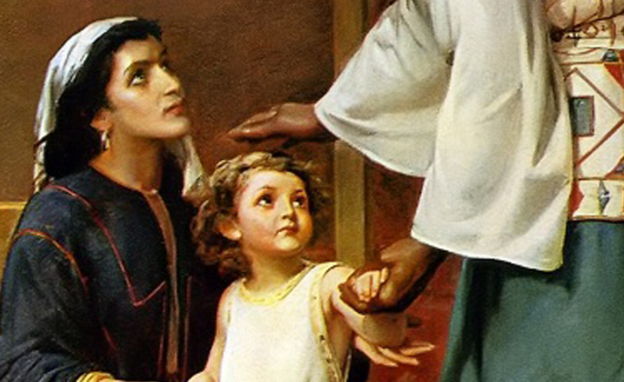Read 1 Samuel 1:21-28
Hannah’s despair led her to prayer, and led her to offer back the child she asked from God were he to grant her wish. God graciously gave her the child she sought, but would Hannah keep her vow or attempt to slide her way out of her obligations?
This passage demonstrates that, true to their form as devout worshipers of God, Hannah and her husband Elkanah were committed to the vow she had made to God at the Temple. It also shows us the importance which both placed on fulfilling their vows before God, and that they did so with thankfulness rather than begrudgingly. And it demonstrates the importance of placing the worship of God at the centre of everything we do, and everything we offer.
After returning comforted from the Temple, God blessed Hannah and Elkanah with a son (vv.19-20). This son was named Samuel, recognising that God had heard Hannah’s prayers and vow to offer this child to God for service (vv.11, 20).
Now that the child was born and the bundle of joy in her arms, we might not be surprised if we were to read that Hannah had second thoughts about her vow, and looked for an opportunity to back out of the deal somehow.
However, vows to God are more important than the promise we made as a child to the schoolkid with fish and chips for lunch that “if you give me a chip I will be your best friend!” The writer of Ecclesiastes reminds us to “not delay” paying a vow to God; that it is better to not vow than vow and not fulfil, because this is sin (Ecclesiastes 5:4-6).
Both Hannah and Elkanah were aware of the seriousness of the vow made, and serious in intention to fulfil it. Thus when Elkanah went to go to the Temple again to offer sacrifices as was his yearly pattern (v.3), Hannah refused to go up (vv.21-2).
Hannah realised that if she were to go while Samuel was still breastfeeding and return (because dumping a breastfed child on the Temple was a significant burden), it would affect the way others viewed the seriousness of her vow. Better to wait until the child was weaned (about 3 years of age) and then take him to the Temple “so that he may appear in the presence of the Lord and dwell there forever” (v.22).
Under the Law, a husband had to confirm the validity of a vow (Numbers 30). Elkanah agreed both with Hannah’s vow, and Hannah’s approach to meeting the vow. He asks God to assist them both in fulfilling it (v.23).
After weaning Samuel, Hannah was faithful to fulfil her vow to God, and returned to the Temple with the boy (v.24). She also came with the gifts traditionally required, but in greater measure.
According to Numbers 15, when fulfilling a vow to God you were to come with a young bull and measures of fine flour and wine. Hannah is diligent in fulfilling this requirement, but also shows her great thankfulness to God by providing three times what is required (v.24. Many translations translate the verse as a “3 year old bull” for consistency with verse 25 which speaks of one bull, but three bulls is an alternative rendering and consistent with the greater measures of flour and wine provided.)
After the obligatory sacrifices, Hannah and Elkanah brought Samuel to Eli (v.25). Hannah reminded Eli of their previous interaction, his blessing on her vow, and how she had now come to give back to God what God had given her – their son (vv.26-8). From that day, Samuel served and worshipped God in the Temple (v.28).
In Hannah and Elkanah we see a godly couple focused on worshipping God and giving to him what was owed. They were consistent in their pattern of worship, and they were committed to their vows. They model to us how we ought to live our lives; focused on God.
They were also careful to ensure that Samuel would be old enough and prepared enough to serve God, rather than leaving him before he was physically ready. For us parents, this is a model of behaviour for us. While our kids will probably not be Epoch-defining prophets like Samuel was, we still desire for them to serve God in whatever way he calls them, and they cannot do this if not properly prepared.
But they were also models of thankfulness. They did not begrudgingly give Samuel back to avoid a whack from God, but did so with joy. We see this in how they gave three times what was required, a great sacrifice; and how they presented Samuel to Eli, to serve God.
All of what we have comes from God. It is fitting to devote our lives and possessions back to God, for his service. Not because of what we might get out of it, but because we are giving back with thanks for what we have already received, and what it promises for the future.


